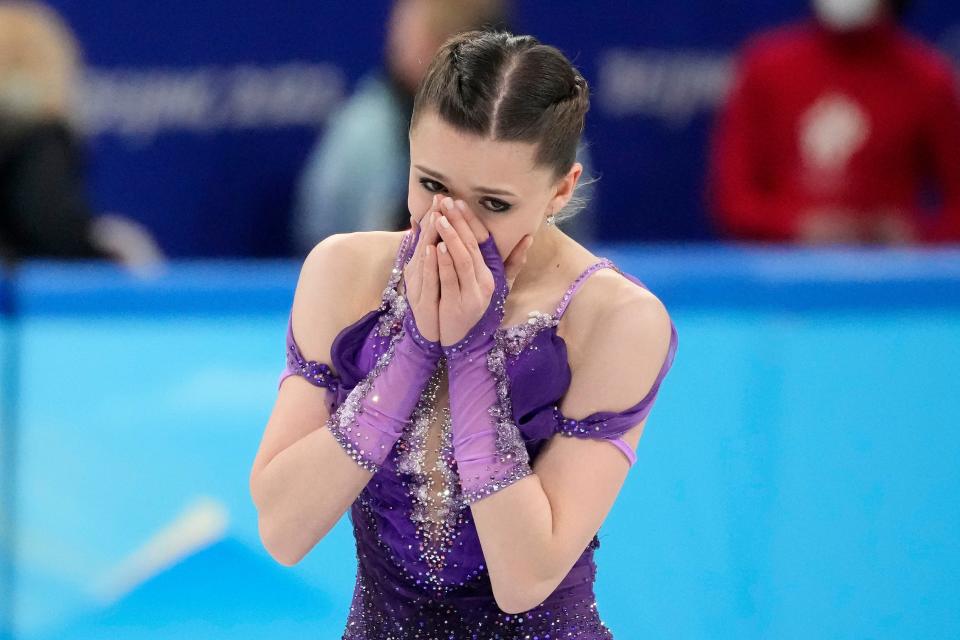Russian teen skater Kamila Valieva cleared to compete at Olympics despite positive drug test
Written by ABC AUDIO on February 14, 2022
BEIJING — Kamila Valieva has been cleared to compete at the 2022 Winter Olympics.
In a momentous decision, the Court of Arbitration for Sport ruled Monday in favor of the Russian figure skating superstar and the country’s anti-doping agency, dismissing the provisional suspension that Valieva, 15, would have otherwise faced after she tested positive for a banned heart medication.
The CAS panel reasoned that the six-week delay from the time Valieva’s sample was collected to the time she was informed of the positive result was “not her fault” and noted her special status as a “protected person” under world anti-doping rules, because she is not yet 16.
“In particular, the Panel considered that preventing the Athlete from competing at the Olympic Games would cause her irreparable harm in these circumstances,” CAS wrote in its decision.
The ruling means that Valieva will be able to compete in the women’s individual competition, which starts Tuesday. She is favored to win gold in the event.
It also sparked immediate backlash, including from the U.S. Olympic and Paralympic Committee. Sarah Hirshland, the CEO of the USOPC, said it was “disappointed by the message this decision sends.”
“It is the collective responsibility of the entire Olympic community to protect the integrity of sport and to hold our athletes, coaches and all involved to the highest of standards,” Hirshland said. “Athletes have the right to know they are competing on a level playing field. Unfortunately, today that right is being denied. This appears to be another chapter in the systemic and pervasive disregard for clean sport by Russia.”
NO MEDALS CEREMONY: IOC will not hold medal ceremony for team figure skating event
BRENNAN: What a slap in the face the Kamila Valieva decision is for athletes who don’t cheat
LIVE UPDATES: Follow all the Olympic action of the day


Valieva’s case has dominated headlines at the Beijing Winter Olympics for several days now and cast a pall over the figure skating competition, while also drawing some of the largest governing bodies in global sports – including the International Olympic Committee and the World Anti-Doping Agency – into a complex, high-stakes legal battle.
The CAS ruling marks a significant defeat for the IOC, WADA and the International Skating Union at the hands of the Russian Anti-Doping Agency, whose disciplinary panel had lifted Valieva’s suspension earlier this week.
The IOC and ISU said they were still reviewing the decision as of late Monday afternoon. WADA issued a strong rebuke – pointing out that the CAS ruling appears to carve out an exemption with anti-doping rules that does not exist.
“While WADA has not received the reasoned award, it appears that the CAS panel decided not to apply the terms of the (WADA) Code,” the organization said in a statement.
Meanwhile, exactly 30 minutes after the decision was announced, Valieva took the ice at a practice rink near Capital Indoor Stadium with five other skaters. At least 100 international reporters, photographers and videographers looked on as she ran through her practice session. She did not take questions afterwards.
The reigning Russian and European champion, Valieva helped Russia win gold in the team figure skating event at the Games late last week with a pair of dazzling performances. She also became the first woman to ever land a quadruple jump at the Olympics.
But by early Tuesday in Beijing, before the medals from the event were awarded, Russian officials received word that a lab in Sweden had detected trimetazidine, which has been banned since 2014, in one of her samples from a previous event – putting the medal ceremony for the team event on pause.
According to the ITA, the sample was obtained Dec. 25 at the Russian national championships in St. Petersburg, more than six weeks before the Swedish lab reported the findings. RUSADA attributed the delay to COVID-19 issues at the lab.
When reached by USA TODAY Sports, WADA spokesperson James Fitzgerald declined to comment on both the reason for this specific delay and the standard timeline for tests to be analyzed at WADA-accredited labs.
After receiving word of the positive result, RUSADA immediately suspended Valieva, as required by WADA rules. But when Valieva appealed, the suspension was swiftly lifted – which set the stage for the IOC’s appeal, and CAS’ intervention.
The IOC and WADA could ostensibly seek an expedited appeal on the merits of Valieva’s case, though such appeals can usually take weeks or months.
After a final determination is made on Valieva’s case, whenever that might be, the ISU will then determine what it means for the standings in the team event. A Russian disqualification would give Team USA the gold medal, with Japan elevated to silver and Canada receiving bronze.
Any medal Valieva wins in the individual competition could also be retroactively taken from her, depending on the details of the ruling.
Valieva has not commented publicly on her case. But her coach, Eteri Tutberidze, defended the 15-year-old to a Russian television station on Saturday.
“I want to say that we are absolutely sure that Kamila is innocent and pure,” Tutberidze told Channel One Russia, according to TASS, a Russian news agency. “And for us this is not a theorem, but an axiom. It does not need to be proven.”
Valieva has also received support from the Russian Olympic Committee all the way up to the Kremlin. Alexander Gorshkov, the president of the Russian Figure Skating Federation, was among those in Russia who praised the CAS ruling Monday.
“The only thing that can be said here is that common sense and justice have triumphed,” he told Russian news agency RIA Novosti.
The decision to allow a Russian skater to continue competing at the Games, despite testing positive for a banned substance, comes as Russia is still being sanctioned for state-sponsored doping efforts.
The nation is barred from having any formal presence at the Winter Olympics, though more than 200 of its athletes are still competing for the “Russian Olympic Committee.”
The sanctions came after a WADA-sponsored investigation found that more than 1,000 Russian athletes benefitted from state-sponsored doping programs from 2011 to 2015. Most notably, the probe found that Russian agents swapped dirty urine samples for clean ones through a hole in the wall during the 2014 Sochi Games.
WADA responded to the investigation by banning Russia from international competition for four years. The duration of the punishment was later cut in half by CAS.
Contact Tom Schad at tschad@usatoday.com or on Twitter @Tom_Schad.
This article originally appeared on USA TODAY: Kamila Valieva: Russian skater allowed to compete at Winter Olympics
The post Russian teen skater Kamila Valieva cleared to compete at Olympics despite positive drug test appeared first on Correct Success.






